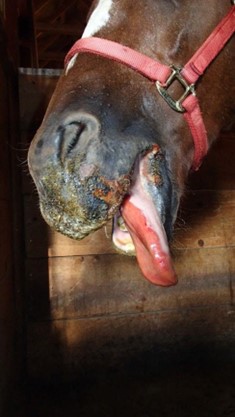 Update May 23, 2023: Quarantines have been imposed by the U.S. Dept. of Agriculture on 15 properties in San Diego County and 4 in Riverside, Locally, 6 cases have been confirmed and 9 more are suspected.
Update May 23, 2023: Quarantines have been imposed by the U.S. Dept. of Agriculture on 15 properties in San Diego County and 4 in Riverside, Locally, 6 cases have been confirmed and 9 more are suspected.
Read more: https://www.eastcountymagazine.org/quarantines-imposed-vsv-livestock-dis...
By Miriam Raftery
May 20, 2023 (San Diego’s East County) – A case of Vesicular Stomatitis Virus (VSV), a viral disease which causes severe blister-like lesions on the mouths and hooves of horses, cattle, pigs, goats, llamas, and other hooved livestock, has been confirmed in San Diego County, according to Dr. Craig Chandler, DVM, at the East County Large and Small Animal Practice. According to Dr. Chandler, testing is underway on samples from several other horses in East County with suspected VSV.
According to the American Association of Equine Practitioners, VSV is contagious and debilitating, but rarely life threatening. It can also spread to humans, so safe handling procedures should be followed.
The disease is reportable; livestock should be isolated for 14 days after the last case. The disease takes 2 to 8 days from exposure to appear and usually runs it course in about 2 weeks, though sores can take up to months to resolve. Testing is required to confirm presence of the disease.
Dr. Chandler posted the following information on Facebook and gave permission for ECM to reprint it, along with a photo:
Recent comments